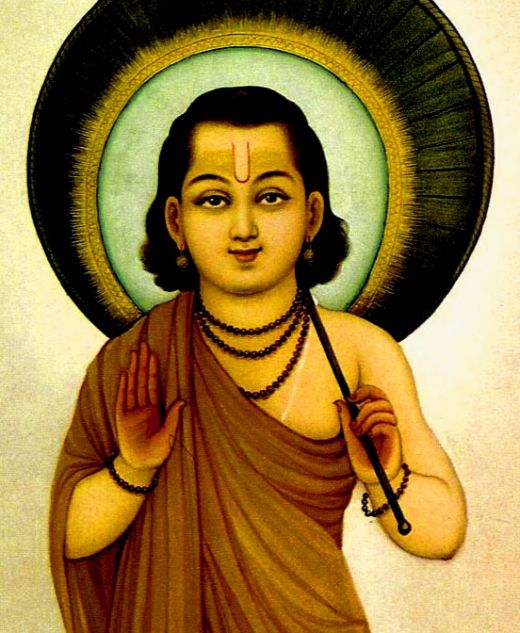“The entirety of whatever there may be within the three worlds to satisfy one’s senses cannot satisfy a person whose senses are uncontrolled.” (Srimad Bhagavatam 8.19.21 )
The above words of wisdom were spoken by Vamanadeva, the fifth of the Dasavatara (Vishnu’s ten incarnations), to Maharaja Bali. It’s one of my favorite verses regarding santosha (contentment), one of the niyamas in ashtanga-yoga as well as an essential quaility in bhakti-yoga. Thursday, September 11, marks the observance of Vamanadeva’s appearance. I’ve included a few verses from from Vamanadeva’s discussions with Bali. One can read a more complete telling of lila here. The painting is by B.G. Sharma.
Kaustubha das
(Srimad Bhagavatam 8.19.16)
tasmat tvatto mahim ishad
vrine ‘ham varadarshabhat
padani trini daityendra
sammitani pada mama
O King of the Daityas, from Your Majesty, who come from such a noble family and who are able to give charity munificently, I ask only three paces of land, to the measurement of My steps.
(Srimad Bhagavatam 8.19.17)
nanyat te kamaye rajan
vadanyaj jagad-isvarat
nainah prapnoti vai vidvan
yavad-artha-pratigrahah
O King, controller of the entire universe, although you are very munificent and are able to give Me as much land as I want, I do not want anything from you that is unnecessary. If a learned brahmana takes charity from others only according to his needs, he does not become entangled in sinful activities.
(Srimad Bhagavatam 8.19.18)
sri-balir uvaca
aho brahmana-dayada
vacas te vriddha-sammatah
tvam balo balisa-matih
svartham praty abudho yatha
Bali Maharaja said: O son of a brahmana, Your instructions are as good as those of learned and elderly persons. Nonetheless, You are a boy, and Your intelligence is insufficient. Thus You are not very prudent in regard to Your self-interest.
(Srimad Bhagavatam 8.19.19)
mam vacobhih samaradhya
lokanam ekam isvaram
pada-trayam vrinite yo
‘buddhiman dvipa-dasusham
I am able to give You an entire island because I am the proprietor of the three divisions of the universe. You have come to take something from me and have pleased me by Your sweet words, but You are asking only three paces of land. Therefore You are not very intelligent.
(Srimad Bhagavatam 8.19.20)
na puman mam upavrajya
bhuyo yacitum arhati
tasmad vrittikarim bhumim
vato kamam praticcha me
O small boy, one who approaches me to beg something should not have to ask anything more, anywhere. Therefore, if You wish, You may ask from me as much land as will suffice to maintain You according to Your needs.
(Srimad Bhagavatam 8.19.21)
sri-bhagavan uvaca
yavanto vishayah preshthas
tri-lokyam ajitendriyam
na saknuvanti te sarve
pratipurayitum nripa
The Personality of Godhead said: O my dear King, even the entirety of whatever there may be within the three worlds to satisfy one’s senses cannot satisfy a person whose senses are uncontrolled.
(Srimad Bhagavatam 8.19.22)
tribhih kramair asantushto
dvipenapi na puryate
nava-varsha-sametena
sapta-dvipa-varecchaya
If I were not satisfied with three paces of land, then surely I would not be satisfied even with possessing one of the seven islands, consisting of nine varshas. Even if I possessed one island, I would hope to get others.
(Srimad Bhagavatam 8.19.23)
sapta-dvipadhipatayo
nripa vainya-gayadayah
arthaih kamair gata nantam
trishnaya iti nah srutam
We have heard that although powerful kings like Maharaja Prithu and Maharaja Gaya achieved proprietorship over the seven dvipas, they could not achieve satisfaction or find the end of their ambitions.
(Srimad Bhagavatam 8.19.24)
yadricchayopapannena
santushto vartate sukham
nasantushtas tribhir lokair
ajitatmopasaditaih
One should be satisfied with whatever he achieves by his previous destiny, for discontent can never bring happiness. A person who is not self-controlled will not be happy even with possessing the three worlds.
(Srimad Bhagavatam 8.19.25)
pumso ‘yam samsriter hetur
asantosho ‘rtha-kamayoh
yadricchayopapannena
santosho muktaye smritah
Material existence causes discontent in regard to fulfilling one’s lusty desires and achieving more and more money. This is the cause for the continuation of material life, which is full of repeated birth and death. But one who is satisfied by that which is obtained by destiny is fit for liberation from this material existence.
(Srimad Bhagavatam8.19.26)
yadriccha-labha-tushtasya
tejo viprasya vardhate
tat prasamyaty asantoshad
ambhasevasusukshanih
A brahmana who is satisfied with whatever is providentially obtained is increasingly enlightened with spiritual power, but the spiritual potency of a dissatisfied brahmana decreases, as fire diminishes in potency when water is sprinkled upon it.
(Srimad Bhagavatam 8.19.27)
tasmat trini padany eva
vrine tvad varadarshabhat
etavataiva siddho ‘ham
vittam yavat prayojanam
Therefore, O King, from you, the best of those who give charity, I ask only three paces of land. By such a gift I shall be very pleased, for the way of happiness is to be fully satisfied to receive that which is absolutely needed.
Translation by Srila A.C. Bhaktivedanta Swami Prabhupada, courtesy of The Bhaktivedanta Book Trust International, Inc. Used with permission.
(The Srimad Bhagavatam (Bhagavat Purana, or simply the Bhagavatam) holds a prominent position in India’s voluminous spiritual literature. Consisting of about 18,000 Sanskrit verses, it blends profound theological insight and social and ethical reflection with exquisite poetry to develop its evolved doctrine of bhakti. The Bhagavatam takes the form of a collection of stories narrated by the rishi Sukadeva to King Parikshit, the grandson of Arjuna. Regarding its influence, Professor Edwin F. Bryant notes that the Bhagavatam “has inspired more derivative literature, poetry, drama, dance, theater and art than any other text in the history of Sanskrit literature, with the possible exception of the Ramayana.”)
Related Posts: On Perceiving the Subtle in Bhakti-yoga / A Madman’s Discourse on the Workings of the Mind / The Ornaments of a Sadhu
